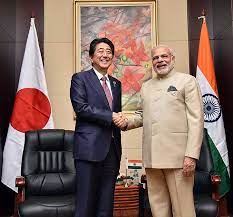

By Our Editorial Team
First publised on 2022-07-09 03:08:23
Former Japanese Prime Minister Shinzo Abe was assassinated near a train station in Nara, the old capital of Japan. He was campaigning for a junior politician from his party when a 41-year old man, who held a grudge against Abe for 'supporting' a group which he did not like, killed him by firing from a 'homemade' gun. Abe was the longest-serving, post-war Japanese Prime Minister. Prime Minister Modi expressed grief on the loss of a personal friend and a friend of India. He called him a "great visionary" and declared a one-day state mourning in his memory.
Shinzo Abe was instrumental in changing the scope of Indo-Japanese bilateral relationship. As Prime Minister Modi has written in a signed article, "from a largely narrow, bilateral economic relationship, Abe San helped turn it into a broad, comprehensive one, which not only covered every field of national endeavour, but became pivotal for our two countries' and the region's security."
Abe seriously believed in India's ability to rise up and be of immense help to the other countries in Asia. Hence, he signed several agreements with India and ensured that the two countries remained constantly in touch with dialogues at the foreign and defence minister levels. He was also instrumental in including India in all the regional security alliances, including the Quad, with a view to counter Chinese aggression. His personal rapport with Prime Minister Modi also helped and he visited India several times.
As Prime Minister Modi wrote in his tribute, Abe's "foresight in recognizing the changing tides and the gathering storm of our times and his leadership in responding to it" will be his most enduring legacy. In these troubled times, with the expansionist agenda of China and Russia, Shinzo Abe will be missed - by the world and by India.











